七年级下册英语语法《一般过去时的用法》知识点整理
Grammar七年级英语下册——一般过去时

语法精讲一般过去时(Ⅰ)1、一般过去时的基本定义一般过去时表示在过去某一时间发生的动作或存在的状态,也可以表示在过去某一阶段经常或反复发生的动作。
2、与一般过去时连用的时间状语yesterday(昨天),last week/month/year(上周/上个月/去年),two days/months ago(两天/两个月前),the day before yesterday(前天),in 2000(在2000年),in those days(在那些日子里),just now(刚才),a moment ago(刚才)等常与一般过去时连用。
3、一般过去时的句式结构(1)、含be动词的过去时的句式①肯定句:主语+was/were+其他.如:I was late for school yesterday morning.昨天早上我上学迟到了。
②否定句:主语+was/were+not+其他.如:The school trip wasn't interesting last week.上周的学校旅行不是很有趣。
③一般疑问句:Was/Were+主语+其他?肯定回答:Yes,主语+was/were.否定回答:No,主语+wasn't/weren't.如:—Were you late yesterday?你昨天迟到了吗?—Yes,I was./No,I wasn't.是的,我迟到了。
/不,我没有迟到。
(2)含实义动词的过去时的句式①肯定句:主语+动词过去式+其他.如:They had a good time yesterday.他们昨天玩得很开心。
②否定句:主语+did not(didn't)+动词原形+其他.如:They didn't watch TV last night.昨天晚上他们没有看电视。
③一般疑问句:Did+主语+动词原形+其他?肯定回答:Yes,主语+did.否定回答:No,主语+didn't.如:—Did you go to the park yesterday?昨天你去公园了吗?—Yes,I did./No,I didn't.是的,我去了,/不,我没去。
一般过去时

2.We went to Beijing last month .(改为一般疑问 句,并作否定回答)
( C )3. ___ he at school yesterday?
A. Does B. Did
C. Was
( C )4. —___ you in Shanghai last week?
—Yes, I ___.
A. Was; was B. Did; did C. Were; was
( B )5. Class One ___ the football match yesterday
3. meet _m_e_t__ 6. teach _ta_u_g_h_t 9. fly _f_le_w__ 12. drive _d_r_o_v_e 15. tell _t_o_l_d_
二、用括号内所给动词的适当形式填空。 1. Tom and Mary _c_a_m_e_(come) to China last month. 2. Mary _r_e_a_d_(read) English yesterday morning. 3. There _w_e_r_e_(be) no children here ten minutes ago. 4. What __d_id__ you __d_o__ the day before yesterday?(do) 5. Last week wep_i_c_ke_d_(pick) many apples on the farm.
四、单项填空。
(word版)初一下英语一般过去时

第四讲:一般过去时一、定义:表示过去某个时间里发生的动作或存在的状态,也表示过去经常或反复发生的动作。
表示过去某个时间里发生的动作或存在的状态:e.g.Hewastwelvelastyear.Shewasatwork.表过去经常或反复发生的动作:e.g.Sheoftencametohelpusinthosedays.Mrs.Peteralwayscarriedanumbrella..二、常与一般过去时连用的词:时间状语ago〔twohoursago〔一段时间+ago〕yesterday〔morning,afternoon,evening〕thedaybeforeyesterdaylastweek,last(year,night,month )具体时间〔如Jan.fourth)justnowattheageof10(过去时间段)onedaylongagoonceuponatimethismorning(afternoon,evening)longlongago〔很久以前〕theotherday〔前几天〕atthemoment三、一般过去时的构成1、系动词be的一般过去时构成:主语+ be〔was,were〕+ 其他主语是〞I〞时----- was主语为单数时----- was主语为复数及you时----- were否认句的构成: 主语+be+not+ 其他was not=wasn’twere not=weren’t【活学活用】填入适当的be动词。
1、Kitty_____anEnglishgirl.(be)itcoldinyourcityyesterday?3、I_____notfromTaizhou.4.It________(be)hotyesterdayandmostchildren_______(be)outside.5、She_____tall.Howmanypeople________(be)thereinyourclasslastterm?There________(be)afootballmatchonTVyesterdayevening.I__________(be)tiredyesterday._______atschooljustnow.1________atthecamplastweek.________studentstwoyearsago.________onthefarmamomentago.Ling________elevenyearsoldlastyear.________anappleontheplateyesterday.________somemilkinthefridgeonSunday.2、情态动词的一般过去时构成:主语+情态动词+动词原形+其他She had to do herhomeworkyesterday.注意:情态动词后的动词一定要用原形,而且只能是情态动词的过去式。
初中英语知识点总结一般过去时

初中英语知识点总结一般过去时一、一般过去时的用法:一般过去时表示过去发生或完成的动作、存在的状态或做过的事情。
1.表示过去一些时间发生的动作或存在的状态:- I played soccer yesterday.(我昨天踢足球。
)- He lived in Beijing when he was young.(他年轻时住在北京。
)2.表示过去的习惯性动作或经常发生的动作:- When I was a child, I always went to bed early.(我小的时候总是早睡。
)3.表示过去的客观事实或真理:- The dinosaurs died out millions of years ago.(恐龙在几百万年前灭绝了。
)- She didn't know the answer to the question.(她不知道问题的答案。
)4.表示过去的心理活动、愿望或打算等:- I wanted to be a doctor when I was young.(我年轻时想做一名医生。
)- He hoped to go to the park with his friends.(他希望和朋友去公园。
)二、一般过去时的构成:1.肯定句式:主语+动词的过去式+其他成分- I played basketball last week.- She lived in London for three years.- They watched a movie at the cinema yesterday.2.否定句式:主语 + did not / didn't + 动词原形 + 其他成分- I didn't play basketball last week.- She didn't live in London for three years.- They didn't watch a movie at the cinema yesterday.3.疑问句式:Did + 主语 + 动词原形 + 其他成分?- Did you play basketball last week?- Did she live in London for three years?- Did they watch a movie at the cinema yesterday?三、一般过去时的特殊情况:1.动词过去式的构成规则:a) 一般情况下,动词的过去式在词尾加上-ed:walk - walked(走)talk - talked(说话)play - played(玩)b)以字母e结尾的动词,在词尾只加-d:dance - danced(跳舞)c) 以辅音字母+y结尾的动词,将y变为i,再加-ed:study - studied(学习)d) 以重读闭音节结尾,末尾只有一个辅音字母的动词,双写这个辅音字母,再加-ed:stop - stopped(停止)plan - planned(计划)2.部分动词的过去式不规则,需要记忆:be - was / were(是)have - had(有)go - went(去)do - did(做)write - wrote(写)see - saw(看见)eat - ate(吃)drink - drank(喝)take - took(拿)四、表示一般过去时的时间状语:1.表示过去一些时间的状语:yesterday(昨天)last week(上星期)two days ago(两天前)2.表示过去的时间段的状语:when I was young(我年轻时)in my childhood(在我童年时)in the past(在过去)3.表示过去曾经做过的动作的状语:once(一次)五、注意事项:1. 一般过去时的句子中,谓语动词要用过去式,但be动词有时会用was或were。
仁爱版英语七年级下册语法小结:一般过去时
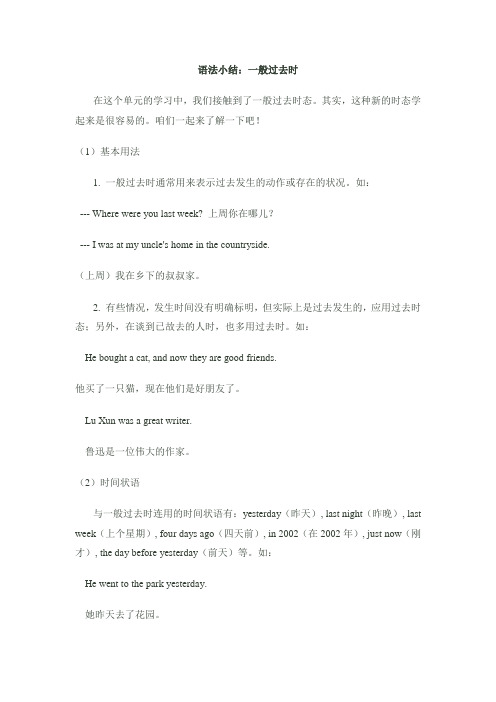
语法小结:一般过去时在这个单元的学习中,我们接触到了一般过去时态。
其实,这种新的时态学起来是很容易的。
咱们一起来了解一下吧!(1)基本用法1. 一般过去时通常用来表示过去发生的动作或存在的状况。
如:--- Where were you last week? 上周你在哪儿?--- I was at my uncle's home in the countryside.(上周)我在乡下的叔叔家。
2. 有些情况,发生时间没有明确标明,但实际上是过去发生的,应用过去时态;另外,在谈到已故去的人时,也多用过去时。
如:He bought a cat, and now they are good friends.他买了一只猫,现在他们是好朋友了。
Lu Xun was a great writer.鲁迅是一位伟大的作家。
(2)时间状语与一般过去时连用的时间状语有:yesterday(昨天), last night(昨晚), last week(上个星期), four days ago(四天前), in 2002(在2002年), just now(刚才), the day before yesterday(前天)等。
如:He went to the park yesterday.她昨天去了花园。
I was ten years old in 2001.我2001年才10岁。
(3)动词的过去式在一般过去时态中会涉及到动词的过去式,大家要掌握规则动词的过去式的变化规则。
其基本的变化规则如下:①一般情况下,在动词原形后直接ed。
如:play –played , look –looked 。
②以e结尾的动词在其后加d。
如:like –liked, use –used。
③与辅音字母加y结尾的动词,把y变成i 再加ed。
如:carry – carried, marry - married。
④以重读闭音节(或r音节)结尾,末尾只有一个辅音字母时,双写这个辅音字母,再加ed。
七年级下册英语语法《一般过去时的用法》知识点整理
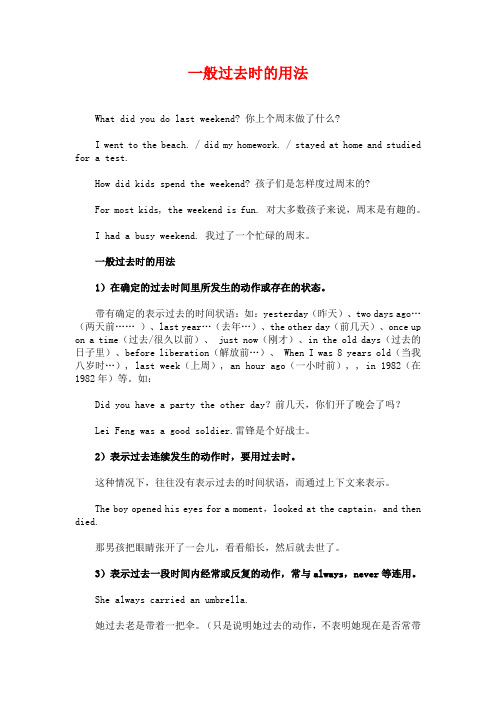
一般过去时的用法What did you do last weekend? 你上个周末做了什么?I went to the beach. / did my homework. / stayed at home and studied for a test.How did kids spend the weekend? 孩子们是怎样度过周末的?For most kids, the weekend is fun. 对大多数孩子来说,周末是有趣的。
I had a busy weekend. 我过了一个忙碌的周末。
一般过去时的用法1)在确定的过去时间里所发生的动作或存在的状态。
带有确定的表示过去的时间状语:如:yesterday(昨天)、two days ago…(两天前…… )、last year…(去年…)、the other day(前几天)、once up on a time(过去/很久以前)、 just now(刚才)、in the old days(过去的日子里)、before liberation(解放前…)、 When I was 8 years old(当我八岁时…), last week(上周), an hour ago(一小时前), , in 1982(在1982年)等。
如:Did you have a party the other day?前几天,你们开了晚会了吗?Lei Feng was a good soldier.雷锋是个好战士。
2)表示过去连续发生的动作时,要用过去时。
这种情况下,往往没有表示过去的时间状语,而通过上下文来表示。
The boy opened his eyes for a moment,looked at the captain,and then died.那男孩把眼睛张开了一会儿,看看船长,然后就去世了。
3)表示过去一段时间内经常或反复的动作,常与always,never等连用。
英语语法:一般过去时的用法

英语语法:一般过去时的用法英语语法:一般过去时的用法导语:一般过去时是一种英语时态。
它表示过去某个时间里发生的动作或状态;过去习惯性、经常性的动作、行为;过去主语所具备的能力和性格。
下面是小编为您收集整理了一般过去时的用法,欢迎阅读! 一般过去时的具体用法如下:1. 在条件、时间状语从句中代替一般过去将来时They said they would let me know as soon as they got there.他们说只要他们一到达那儿就会马上让我知道的。
He said he would not go if it rained.他说如果下雨他就不去。
2. 表示过去的习惯性或经常发生的动作一般过去时表示过去经常或反复发生的动作,常和“often经常,always总是,once a week一周一次”等表示频度的时间状语连用。
I went to the cinema once a week when I was at school.我上学时每周去看一场电影。
When I was in the countryside, I often walked by the riverside.我在乡下时经常在河边散步。
3、表示过去一段时间内经常或反复发生的.动作,也可以用would+动词原形或用used to加动词原形:When he was young, he would go skating every winter.他年轻时每年冬天都要去滑冰。
Mrs Smith used to have a big house in down town.史密斯夫人在城里曾经有一座大房子。
4. 用于虚拟语气If only I were a bird.要是我是只鸟儿就好了。
(表示不可能)Did you wish to see me?你是找我吗?(表示委婉)5. 表示过去某个特定时间发生的动作或存在的状态这种情况下常与“just now刚才,yesterday昨天,last year去年,in 1999在1999年,two days ago两天之前”等表示过去的时间状语连用。
人教版英语七年级下-一般过去时结构及用法

一般过去时的结构及用法动词过去式的变化规则如下:动词过去式的不规则变化:一般过去时结构:be 肯定句否定句一般疑问句一般过去时中,谓语动词用过去式表示。
谓语动词为be动词的肯定句结构为“主语+was/were+其他.”如:I was a teacher three years ago.我三年前是个老师。
They were at home yesterday.他们昨天在家。
否定句结构为“主语+was not (wasn't)/were not (weren't)+其他.”如:I was not (wasn't) at home yesterday.我昨天不在家。
They were not (weren't) happy just now.他们刚刚不开心。
一般疑问句结构为“Was/Were+主语+其他?”肯定回答为“Yes, 主语+was/were.”否定回答为“No, 主语+wasn't/weren't.”如:-Were you at home last night?-Yes, I was./No, I wasn't.-你昨晚在家吗?-是的,我在家。
/不,我不在家。
特殊疑问句:在句子时态为一般过去时的特殊疑问句中,当谓语动词为be动词时,其句子结构为“特殊疑问词+was/were+主语+其他?”。
如:-What was your father ten years ago? 10年前你的爸爸是做什么的?-He was a worker in a car factory. 他是一家汽车工厂的工人。
注:当特殊疑问词在句中作主语时,其句子结构为“特殊疑问词+was/were+其他?”。
如:Who was on duty yesterday? 昨天谁值日?一般过去时中常见的时间词:ago, yesterday, the day before yesterday, the other day, last week, last (year, night, month…),in1989, just now, long ago, once upon a time, etc.如:Once upon a time, there was a beautiful girl named Snow White.从前,有一个叫白雪公主的美丽的女孩。
英语一般过去时语法知识点总结(完整版)这一篇就够了

英语一般过去时语法知识点总结(笔记完整版)这一篇就够了1 一般过去时的定义总结1.1 描述发生在过去时间的事情或者动作。
The meeting started at 9 o’clock. 会议在9点就开始了。
1.2 表示在过去时间所存在的状态。
I was sick last month. 我上个月生病了。
1.3 表示发生在过去,但是已经结束的事件或者动作。
We had hamburger for lunch. 我们午饭吃了汉堡。
看下面表格区分一般过去时一般现在时和一般将来时一般过去时I was two years old then. 我那时候2岁。
一般现在时I am two years old now. 我现在2岁。
一般将来时I will be two years old next Monday. 到下周一我就2岁了。
2. 一般过去时的表现/结构形式。
在汉语中表示过去只需要说时间就可以了,过去的时间就表示过去。
比如,我昨天吃汉堡了。
就表示过去但是在英语中,表示过去除了加时间(有时候也不加),还需要在动词上体现出来。
具体有2种表现形式。
一种是在Be动词上体现,一种是在实义动词(能够独立做谓语的动词)上体现。
2.1 Be动词的一般过去时Be动词的一般过去时视主语不同,有2种was/were。
主语为单数或者我时,用was。
I was two years old last year. 我去年2岁She was two years old last year. 她去年2岁主语为复数或你时用were。
We were in the library this morning。
早上我们在图书馆You were thin last year。
你去年比较苗条。
Be动词过去时的肯定及否定肯定句结构:主语+was/were +否定句结构:主语+was/were +not+否定与的缩写结构was not = wasn’t , were not = weren’t例句:翠花去年是个胖子Cuihua was fat last year.翠花去年不胖Cuihua was not(wasn’t) fat last year.Be 动词过去时的一般疑问句,与常规一般疑问句一样,把Be动词提前即可。
七年级语法:一般过去时的用法

七年级语法:一般过去时的用法一般过去时01概念引入I. 何时使用一般过去时?一般过去时表示在过去某个时间里发生的动作或存在的状态。
例如:Lin Tao left for Shanghai at 8:00 yesterday morning.林涛昨天早上八点去上海了。
He was ill last night.昨晚他生病了。
它可以具体分为以下几种情况:1)表示过去经常或反复发生的动作。
例如:Li Tao always went to work by bus last term.上学期李涛一直乘公共汽车上班。
2)表示已故的人曾经做过的事情。
例如:Lao She wrote many great works. 老舍写过许多脍炙人口的作品。
3)表示过去所发生的一系列的动作。
例如:The old man came into the room, took off his clothes and went to bed.这位老人走进屋,脱下衣服,然后上床睡觉了。
Mr. Black got up at six o'clock this morning, dressed, had breakfast, and went to work.布莱克先生今天早上六点起床、穿衣服、吃饭,然后去上班了。
II.如何识别一般过去时?每个时态都会有其独特的标志性词语(主要是时间状语),我们可以称其为“标志词”。
一般过去时常见的标志词有:1. yesterday, the day before yesterday.2. last week / year / month / term …(简称last系列)3. two hours ago, three years ago, a moment ago…(简称ago 系列)4. in / on + 过去的年/月/日,如 in 1999, on April, 20055. just now, once upon a time, one day…02用法讲解Ⅰ. be动词的一般过去时。
外语七年级下册语法一般过去时的梳理

一般过去时导入→I met him yesterday.定义:一般过去时表示过去某个时间里发生的动作或状态;过去习惯性、经常性的动作、行为。
在英语语法中,“时“指动作发生的时间,”态“指动作的样子和状态如: Tom suddenly fel ill yesterday Tom 昨天突然生病了。
She didn't look well when i lat saw her.我上次看见她的时候,她脸色不好2.一般过去时也可与 today,this week,this month ,this year 等时间状语连用。
但是这些时间状语必须指过去,决不包括“现在”在内如: Did you see him today?今天你见过他了吗?(today实际上指的是今天的过去某一时刻)3.一般过去时虽不可以与now连用,但却可以和just now(刚才)连用。
如:He went out just now他刚出去了4.一般过去时表示过去的时候还有以下一些情况①:用于since从句,主句的谓语动词如果用现在完成时。
其后接的since引导的从句一般须用一般过去时如:It's been over a year since i came back from the countryside 我从乡下回来已经一年了(主句的谓语动词 has been 也可以改为 is 但美国英语多用现在完成时)②:时间状语可以省略,前面说过一般过去时常与表过去的时间状语连用,但下面一些情况下,时间状语可以省略---从上文可以清楚地看出来时间状语如:Did you sleep well?---前文如有现在完成时所引导时如:I have been within an inch of life ,and didn't know it!---和现在时态对比时候如: He is no longer the man he was---有表示过去习惯的used to 时候如:I used to play football in the street③:所表的动作已经完成如:I read a book last week上星期我读了一本书④:表示死者的动作和状态。
初一下册英语过去式知识点归纳

初一下册英语过去式知识点归纳初一下册英语过去式知识点归纳有哪些?想了解更多的信息吗,和店铺一起看看吧!以下是店铺分享给大家的初一下册英语过去式知识点,希望可以帮到你!初一下册英语过去式知识点一般过去时并不难,表示过去动作、状态记心间。
动词要用过去式,时间状语句末站。
否定句很简单,didn't 站在动词原形前,其它部分不要变。
一般疑问句也好变,did放在句子前,主语、动原、其它部分依次站。
特殊疑问句也简单,疑问词加一般疑问句记心间。
最后一条请注意,动词过去式要牢记。
一、基本结构1. 肯定句形式:主语+动词过去式+其他否定句形式:①was/were+not; ②在行为动词前加didn't,同时还原行为动词一般疑问句:①was/were提到句首; ②Did+主语+do+其他?例句She often came to help us in those days. I didn't know you were so busy.2. 行为动词的一般过去式。
A. 规则动词的变化规则:1、直接加ed:work——worked look——looked play——played,2、.以e结尾的单词,直接加d:live ——lived hope——hoped use——used,3、以辅音字母+y结尾的,变y为i加ed:study——studied carry——carried4、以元音字母+y结尾的,直接加ed:enjoy ——enjoyed5、以重读闭音节结尾的,双写最后的辅音字母+ed:stop——stoppedplan——plannedB. 规则动词过去式的发音:在清辅音后读/t/,在元音和浊辅音后读/d/,在辅音/t/,/d/后读/id/。
C. 不规则动词变化需参看不规则动词表逐一熟记。
(一般和过去分词一起记忆)。
二、一般过去时的基本用法:1. 通常表示过去发生的而现在已经结束的事件、动作或情况。
初中英语知识点:一般过去时
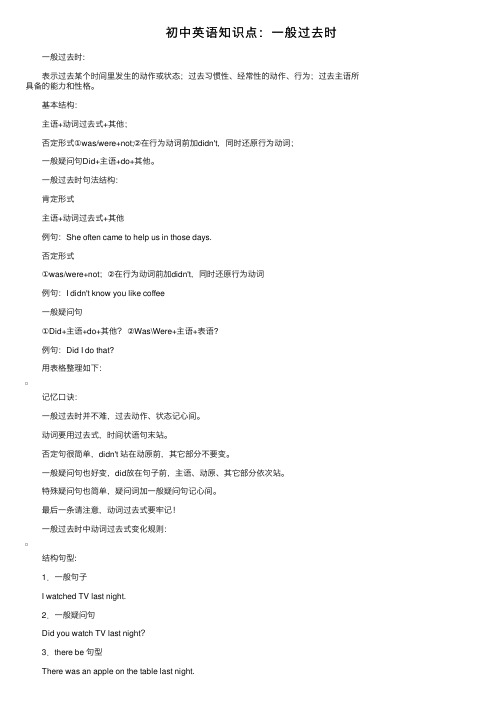
初中英语知识点:⼀般过去时 ⼀般过去时: 表⽰过去某个时间⾥发⽣的动作或状态;过去习惯性、经常性的动作、⾏为;过去主语所具备的能⼒和性格。
基本结构: 主语+动词过去式+其他; 否定形式①was/were+not;②在⾏为动词前加didn't,同时还原⾏为动词; ⼀般疑问句Did+主语+do+其他。
⼀般过去时句法结构: 肯定形式 主语+动词过去式+其他 例句:She often came to help us in those days. 否定形式 ①was/were+not;②在⾏为动词前加didn't,同时还原⾏为动词 例句:I didn't know you like coffee ⼀般疑问句 ①Did+主语+do+其他?②Was\Were+主语+表语? 例句:Did I do that? ⽤表格整理如下: 记忆⼝诀: ⼀般过去时并不难,过去动作、状态记⼼间。
动词要⽤过去式,时间状语句末站。
否定句很简单,didn't 站在动原前,其它部分不要变。
⼀般疑问句也好变,did放在句⼦前,主语、动原、其它部分依次站。
特殊疑问句也简单,疑问词加⼀般疑问句记⼼间。
最后⼀条请注意,动词过去式要牢记! ⼀般过去时中动词过去式变化规则: 结构句型: 1.⼀般句⼦ I watched TV last night. 2.⼀般疑问句 Did you watch TV last night? 3.there be 句型 There was an apple on the table last night. Was there an apple on the table last night ⼀般过去时注意事项: 1.注意主句与从句中时态的⼀致性 如果主句⽤了过去时,从句中⼀般也要⽤过去式,或者过去进⾏时、过去完成时等。
例如: He believed that he was right. 他相信⾃⼰是对的。
七年级下英语语法专题:一般过去时
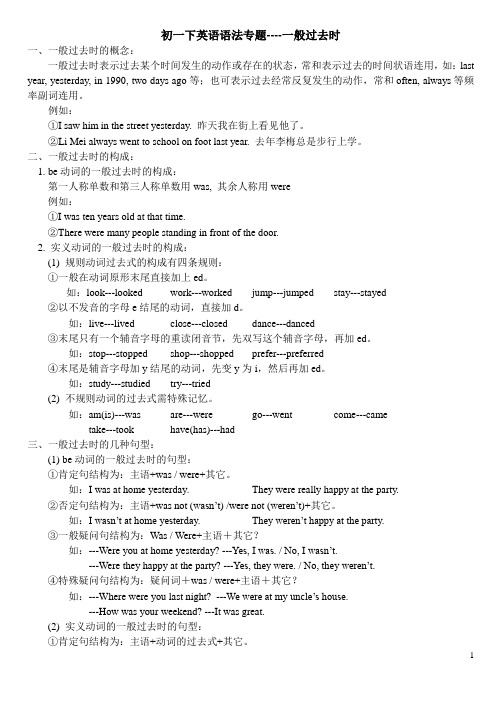
初一下英语语法专题----一般过去时一、一般过去时的概念:一般过去时表示过去某个时间发生的动作或存在的状态,常和表示过去的时间状语连用,如:last year, yesterday, in 1990, two days ago等;也可表示过去经常反复发生的动作,常和often, always等频率副词连用。
例如:①I saw him in the street yesterday. 昨天我在街上看见他了。
②Li Mei always went to school on foot last year. 去年李梅总是步行上学。
二、一般过去时的构成:1. be动词的一般过去时的构成:第一人称单数和第三人称单数用was, 其余人称用were例如:①I was ten years old at that time.②There were many people standing in front of the door.2. 实义动词的一般过去时的构成:(1) 规则动词过去式的构成有四条规则:①一般在动词原形末尾直接加上ed。
如:look---looked work---worked jump---jumped stay---stayed②以不发音的字母e结尾的动词,直接加d。
如:live---lived close---closed dance---danced③末尾只有一个辅音字母的重读闭音节,先双写这个辅音字母,再加ed。
如:stop---stopped shop---shopped prefer---preferred④末尾是辅音字母加y结尾的动词,先变y为i,然后再加ed。
如:study---studied try---tried(2) 不规则动词的过去式需特殊记忆。
如:am(is)---was are---were go---went come---cametake---took have(has)---had三、一般过去时的几种句型:(1) be动词的一般过去时的句型:①肯定句结构为:主语+was / were+其它。
七下(7---12)语法一般过去时
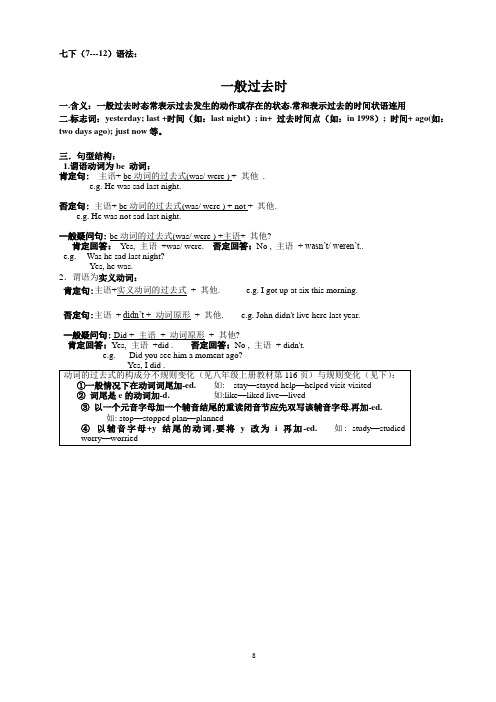
七下(7---12)语法:
一般过去时
一.含义:一般过去时态常表示过去发生的动作或存在的状态,常和表示过去的时间状语连用
二.标志词:yesterday; last +时间(如:last night); in+ 过去时间点(如:in 1998); 时间+ ago(如:two days ago); just now等。
三.句型结构:
1.谓语动词为be 动词:
肯定句: 主语+ be动词的过去式(was/ were ) + 其他.
e.g. He was sad last night.
否定句: 主语+ be动词的过去式(was/ were ) + not + 其他.
e.g. He was not sad last night.
一般疑问句: be动词的过去式(was/ were ) +主语+ 其他?
肯定回答:Yes, 主语+was/ were. 否定回答:No , 主语+ wasn’t/ weren’t..
e.g. ---Was he sad last night?
---Yes, he was.
2.谓语为实义动词:
肯定句:主语+实义动词的过去式+ 其他. e.g. I got up at six this morning.
否定句:主语+ didn’t + 动词原形+ 其他. e.g. John didn't live here last year.
一般疑问句: Did + 主语+ 动词原形+ 其他?
肯定回答:Yes, 主语+did . 否定回答:No , 主语+ didn't.
e.g. ----Did you see him a moment ago?
8。
- 1、下载文档前请自行甄别文档内容的完整性,平台不提供额外的编辑、内容补充、找答案等附加服务。
- 2、"仅部分预览"的文档,不可在线预览部分如存在完整性等问题,可反馈申请退款(可完整预览的文档不适用该条件!)。
- 3、如文档侵犯您的权益,请联系客服反馈,我们会尽快为您处理(人工客服工作时间:9:00-18:30)。
一般过去时的用法
What did you do last weekend? 你上个周末做了什么?
I went to the beach. / did my homework. / stayed at home and studied for a test.
How did kids spend the weekend? 孩子们是怎样度过周末的?
For most kids, the weekend is fun. 对大多数孩子来说,周末是有趣的。
I had a busy weekend. 我过了一个忙碌的周末。
一般过去时的用法
1)在确定的过去时间里所发生的动作或存在的状态。
带有确定的表示过去的时间状语:如:yesterday(昨天)、two days ago…(两天前…… )、last year…(去年…)、the other day(前几天)、once up on a time(过去/很久以前)、 just now(刚才)、in the old days(过去的日子里)、before liberation(解放前…)、 When I was 8 years old(当我八岁时…), last week(上周), an hour ago(一小时前), , in 1982(在1982年)等。
如:
Did you have a party the other day?前几天,你们开了晚会了吗?
Lei Feng was a good soldier.雷锋是个好战士。
2)表示过去连续发生的动作时,要用过去时。
这种情况下,往往没有表示过去的时间状语,而通过上下文来表示。
The boy opened his eyes for a moment,looked at the captain,and then died.
那男孩把眼睛张开了一会儿,看看船长,然后就去世了。
3)表示过去一段时间内经常或反复的动作,常与always,never等连用。
She always carried an umbrella.
她过去老是带着一把伞。
(只是说明她过去的动作,不表明她现在是否常带
着伞。
)
试比较下列句子:
She always carries an umbrella.
她老是带着伞。
(说明这是她的习惯,表明她现在仍然还习惯总带着一把伞)
I never drank wine.我以前从不喝酒。
(不涉及到现在,不说明现在是否喝酒)
如果强调已经终止的习惯时要用used to do,如:
He used to drink.他过去喝酒。
(意味着他现在不喝酒了。
喝酒这个动作终止了)
I used to take a walk in the morning.
我过去是在早晨散步。
(意味着现在不在早晨散步了)
I took a walk in the morning.我曾经在早晨散过步。
(只是说明过去这一动作)
4)有些句子,虽然没有表示过去确定时间的状语,但实际上是指过去发生的动作或存在的状态的话,也要用过去时,这一点,我们中国学生往往出错,要特别注意!
I didn''t know you were in Beijing.
我不知道你在北京。
(因为在说话时,我已经知道你在北京了。
这句话指的是说话之前,所以只能用过去时表示。
实际上,这句话暗指:But now I know you are in Beijing.)
I thought you were ill.
我以为你病了呢。
(这句话应是在说话之前,我以为你病了。
但是现在我知道你没病。
)
注意:用过去时表示现在,表示委婉语气。
1)动词want, hope, wonder, think, intend 等。
Did you want anything else?还要点别的什么吗?
I wondered if you could help me.我想知道你会不会帮我。
2)情态动词 could, would.
Could you lend me your bike?借用一下你的自行车,好吗?本文由索罗学院整理。
